12 Kapitel 9-3: Da- and wo-compounds
9-3: Da- und Wo-Compounds
You’ve been using accusative prepositions, dative prepositions, and two-way prepositions to form sentences for several chapters now.
- Ich habe einen Schreibtisch. Mein Bett steht neben dem Schreibtisch.
- (I have a desk. My bed stands next to the desk.)
In everyday life, when we refer to the same object multiple times, we often substitute pronouns in for nouns. If we were to substitute Schreibtisch in the last sentence with a pronoun, it would look like this.
- Ich habe einen Schreibtisch. Mein Bett steht neben ihm.
German has a shorter way of using pronouns that come after prepositions.
- Ich habe einen Schreibtisch. Mein Bett steht daneben.
- daneben = next to it
We add da to the preposition, and it ends up translating to “it.”
- da + durch = dadurch = through it
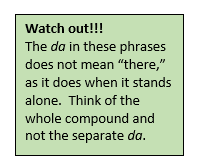
- da + für = dafür = for it
- da + gegen = dagegen = against it
- da + bei = dabei = at it, near it
- da + mit = damit = with it
- da + nach = danach = after it
- da + von = davon = from it, of it
- da + zu = dazu = to it
- da + neben = daneben = next to it
- da + hinter = dahinter = behind it
- da + vor = davor = in front of it
- da + zwischen = dazwischen = between it/them
A: Wo ist dein Mann?
B: Siehst du die zwei blauen Autos dort drüben? Er steht dazwischen.
The good news is that when you use these da-compounds, you don’t have to decide what case they are; you simply add da to the beginning and that’s it!
If the preposition begins with a vowel, we add an extra –r– between the da and the preposition.
- da + um = darum = around it
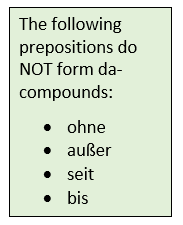
- da + aus = daraus = out of it
- da + an = daran = at it, toward it, on it (vertical)
- da + auf = darauf = on it
- da + in = darin = in it
- da + über = darüber = above it, about it, over it
- da + unter = darunter = under it, beneath it


Beispiel: Hier ist ein Bild von unserem Wohnzimmer. Wir besitzen einen umweltfreundlichen Kamin. Daneben (next to it) steht ein Stuhl aus recyceltem Holz. Ein gebrauchter Teppich liegt auf dem Boden. Dahinter (behind it) ist ein modernes Sofa mit vielen Kissen. Ein Foto hängt darüber (over/above it).
Ex. A: Wo ist er? A friend wants to know where the following people are located. Using the objects in the picture, tell her where each person is standing in relation to it by using a da-compound.

Beispiel: Niko
A: Wo ist Niko?
B: Siehst du den Tisch?
A: Ja, ich sehe ihn.
B: Niko steht darauf.
Ex. B: Beschreiben Sie Ihr Zimmer! Describe your room using both two-way prepositions and da-compounds
Using da-compounds with verbs with prepositional complements:
You can also use these da-compounds with the verbs you learned in section 9-2…especially if the subject is already known or implied.
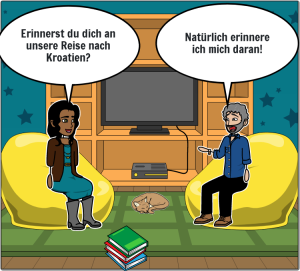
A: Erinnerst du dich an unseren Urlaub nach Kroatien?
(Do you remember our vacation to Croatia?)
B: Natürlich erinnere ich mich daran!
(Of course I remember it!)
A: Du hast dich über unser Hotelzimmer beschwert.
(You complained about our hotel room.)
B: Nein, du hast dich darüber beschwert. Ich habe mich darüber gefreut.
(No, you complained about it. I was happy about it.)
A: Aber am Ende haben wir uns daran gewöhnt.
(But in the end, we got used to it.)
By using da-compounds, it makes your German sound more native-like and flows better. We especially use them a lot with verbs that have prepositional complements.
Ex. C: Da-Komposita. Beantworten Sie die Fragen in ganzen Sätzen. Benutzen Sie ein Da-Kompositum in Ihrer Antwort.
Beispiel: Warten Sie auf den Bus?
→Ja, ich warte darauf.
ODER
→Nein, ich warte nicht darauf.
- Bewerben Sie sich nächsten Sommer um ein Praktikum?
- Haben Sie sich an die steigende Inflation gewöhnt?
- Haben Sie Angst vor dem Tod?
- Beschweren Sie sich oft über das Essen in der Mensa?
- Wer kümmert sich um unsere Reisepläne?
- Bitten Sie am Semesteranfang um mehr Geld?
- Unterhalten Sie sich oft mit Ihren Freunden über Ihre Uni-Kurse?
- Sprechen Sie vom neuen Film?
- Freuen Sie sich auf die Winterferien?
Da-Compounds: Not for people!
Unfortunately, da-compounds can’t be used with people.
A: Erinnerst du dich an meine Großmutter?
B: Ja, ich erinnere mich daran. (WRONG!)

This makes grandma sound like a thing, not a person.
Treat your grandmother and other people like people—not things!
Frage: So…what do we do when people are involved?
Antwort: Use the appropriate pronoun—accusative or dative. Here is a chart that reviews them.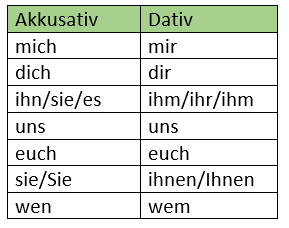
Beispiel: sich beschweren über
- Thing: Der Verkäufer beschwert sich über die Produkte.
- o Der Verkäufer beschwert sich darüber.
- Person: Der Verkäufer beschwert sich über seinen Chef.
- o Der Verkäufer beschwert sich über ihn.
- o (The two-way preposition über goes accusative in this example, so therefore, we will use the accusative pronoun for “him”—ihn.)
Beispiel: Angst haben vor
- Thing: Ich habe Angst vor der Zukunft.
- o Ich habe Angst davor.
- Person: Ich habe Angst vor meiner Schwiegermutter.
- o Ich habe Angst vor ihr.
- o (In this verb phrase, the two-way preposition vor goes dative, so therefore, we use the dative pronouns for “her”—ihr.)
Beispiel: warten auf
- Thing: Marianne und Sabine warten auf das Wochenende.
- o Marianne und Sabine warten darauf.
- Person: Marianne und Sabine warten auf ihren Onkel.
- o Marianne und Sabine warten auf ihn.
- o (In this verb phrase, the two-way preposition auf goes accusative, so therefore we use the accusative pronoun for “him”—ihn.
Beispiel: sich unterhalten über
- Thing: Die Professoren unterhalten sich über die schlechten Noten.
- o Die Professoren unterhalten sich darüber.
- Person: Die Professoren unterhalten sich über einen schlechten Studenten.
- o Die Professoren unterhalten sich über ihn.
- o (In this verb phrase, the two-way preposition über is accusative, so we use the accusative pronoun for “him”—ihn.)
Beispiel: sprechen von
- Thing: Sprichst du von unserem kaputten Auto?
- o Sprichst du davon?
- Person: Sprichst du von unserem Nachbarn?
- o Sprichst du von ihm?
- o (Von is always dative, so we use the dative pronoun for “him”—ihm.)

Watch YourGermanTeacher’s video to see a review of this with more examples:
KULTURECKE: Weihnachten kommt bald! Hören Sie sich die Weihnachtsgeschichte an. Der deutsche Feiertag Weihnachten hat seinen Ursprung in der Geschichte von der Geburt Jesu Christi. Hinweis: es gibt vier Da-komposita! (Audio used with permission from Germanlistening.com.)
KULTURECKE: Man feiert am 6. Dezember den Nikolaustag. Hören Sie sich den Bericht an, um mehr darüber zu lernen. Hinweis: es gibt zwei Da-komposita. (Audio used with permission from Germanlistening.com)
Wo-Compounds:
Sometimes we need to ask questions with verbs that have prepositional complements. When that happens, we often use wo-compounds.

Was ist ein Wo-Kompositum?
It works the same way as a da-compound…except instead of da + the preposition, we write wo + the preposition.
- wo + durch = wodurch = through what
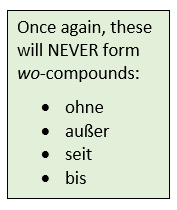
- wo + für = wofür = for what
- wo + gegen = wogegen = against what
- wo + bei = wobei = at it, near what
- wo + mit = womit = with what
- wo + nach = wonach = after what
- wo + von = wovon = from what, of what
- wo + zu = wozu = to what
- wo + neben = woneben = next to what
- wo + hinter = wohinter = behind what
- wo + vor = wovor = in front of what
- wo + zwischen = wozwischen = between what
The preposition ends up becoming part of the question word. In English we often split them: “What are you complaining about?” However, if you were writing an English essay, your professor would probably say never to end a sentence with a preposition, so then you would reword it: “About what are you complaining?” German always puts the two together, almost as if it were a fancy English essay approved by your typical English professor.
Beispiele:
- Wovor hast du Angst?
- (What are you afraid of?/Of what are you afraid?)
- Wofür interessierst du dich?
- (What are you interested in?/In what are you interested?)
If the preposition begins with a vowel, we add an extra –r– between the wo and the preposition.
- wo + um = worum = around what
- wo + aus = woraus = out of what
- wo + an = woran = at what, toward what, on what (vertical)
- wo + auf = worauf = on what
- wo + in = worin = in what
- wo + über = worüber = above what, about what, over what
- wo + unter = worunter = under what, beneath what
Beispiele:
- Woran denkst du?
- (What are you thinking about?/About what are you thinking?)
- Worüber beschwerst du dich?
- (What are you complaining about?/About what are you complaining?)


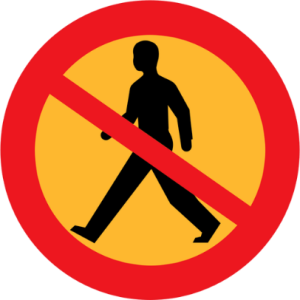
Just like with da-compounds, you can’t use wo-compounds with people—only things. Don’t treat people like things! If you need to ask a question that involves a person and a wo-compound, use either wen (accusative) or wem (dative), depending on whether the case that comes after the preposition is accusative or dative.
Listen to Silbermond’s Wofür (2012) to hear examples of the difference between “wofür” and “für wen.”
Text: https://genius.com/Silbermond-wofur-lyrics
And here’s another song with several wo-compounds in it: Woran glauben wir (2018) by Bell, Book, and Candle.
Ex. E: Wo-Kompositen. Schreiben Sie eine Frage, die jeden Satz beantworten könnte. Benutzen Sie Wo-Kompositen, wenn möglich.
- Marina beschwert sich über ihre Kinder.
- Ihre Kinder kümmern sich nicht um ihre Hausaufgaben.
- Sie sprechen immer vom neusten Videospiel.
- Marina und ihre Kinder streiten sich miteinander.
- Das jüngste Kind hat Angst vor Hunden.
- Er hat sich noch nicht an den Hund in der Nachbarschaft gewöhnt.
- Die älteste Tochter bittet immer um mehr Taschengeld.
- Marina informiert sich über die Probleme ihrer Kinder.
- Sie unterhält sich mit einem Therapeuten über diese Probleme.
- Schließlich bedankt sie sich beim Therapeuten für seine Hilfe.
![]()
Ex. F: Fragen. Hören Sie sich das Audio von Viola, AudioLingua, über die Stadt Köln an. Benutzen Sie Wo-Komposita, um ein paar Fragen zu stellen, die Viola mit dieser Beschreibung beantworten könnte.
Beispiel: Worüber spricht Viola?…usw.
Ex. G: Fragen mit Wo-Kompositen. Übersetzen Sie ins Deutsche!
- What are you talking about?
- Whom has your brother fallen in love with?
- What are the children looking forward to?
- Whom is the customer complaining about?
- What are you registering for?
- What did you get used to in Germany?
- What did the student apply for?
- Whom did y’all/you guys meet with yesterday?
- What did our boss get annoyed about?
- What should we ask for?
- What should we get more information about?
- Whom did the customer argue with?
- What is she afraid of?
- What do you want to talk/converse about?
- What did you thank the professor for?
- Whom do you remember from school?
- For whom are you waiting?
- What are you happy about?
Ex. H: Nicos Weg. Episode 32: Reklamation. Gucken Sie die Episode und beantworten Sie die Fragen.

https://learngerman.dw.com/en/reklamation/l-38166784
Ex. I: Rollenspiel. Sie haben ein Problem mit Ihrem neuen Laptop und möchten reklamieren. Beschreiben Sie das Problem und versuchen Sie eine Lösung zu finden. Sie können gerne auf die Internetseite unten klicken, um weiter zu üben.
https://learngerman.dw.com/en/now-you-have-a-problem/l-38166784/e-38169726
Ex. J: Im Restaurant. Sie sind im Restaurant aber sind nicht zufrieden mit Ihrem Essen. Beschweren Sie sich beim Kellner und versuchen Sie eine Lösung zu finden.
Entschuldigung…usw.
Ex. J: Nicos Weg. Episode 33: Essen gehen. Gucken Sie die Episode und beantworten Sie die Online-Fragen.

https://learngerman.dw.com/en/essen-gehen/l-38211308
Ex. K: Essen und Restaurants.
- Was essen Sie gern? Was essen Sie nicht gern?
- Beschreiben Sie Ihr Lieblingsgericht? Wie oft essen Sie es? Wo kann man es in Ihrem Land probieren?
- Was für Restaurants gibt es in Ihrem Land?
- Was für Essen wird in diesen Restaurants serviert?
- Gehen Sie gern ins Restaurant?
- Vergleichen Sie Ihre zwei Lieblingsrestaurants. Was habe Sie gemeinsam? Wie unterscheiden Sie sich voneinander?

